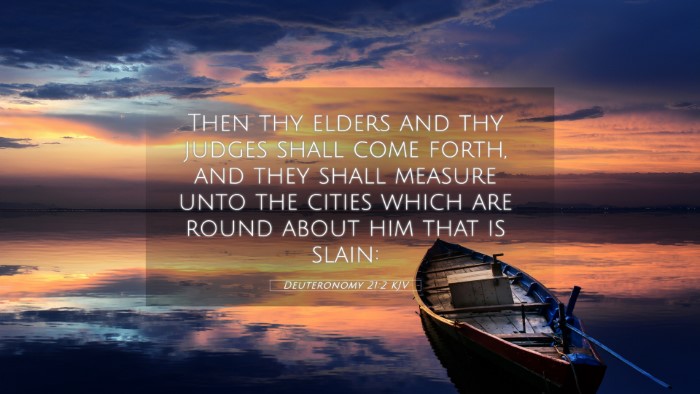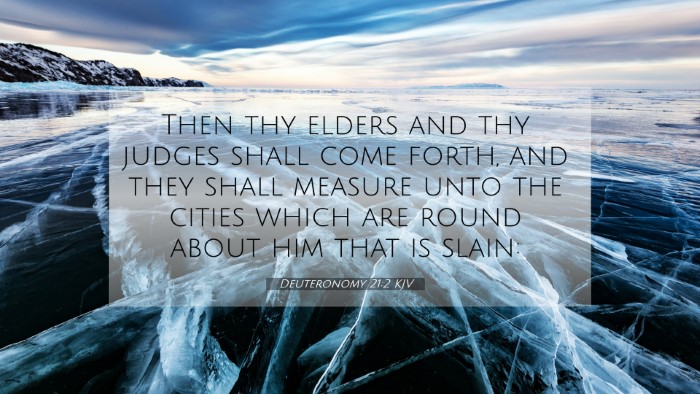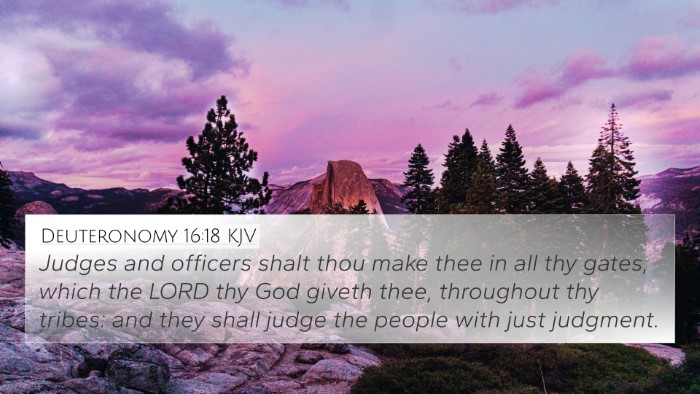Understanding Deuteronomy 21:2
Deuteronomy 21:2 states: "Then your elders and your judges shall go out and measure the distance to the cities, which are around the slain." This verse is part of a series of laws intended to uphold justice and order in the community of Israel. Below, we will explore the meaning of this verse in detail, drawing upon insights from public domain commentaries.
Overview of the Verse
This verse addresses the duty of the elders and judges in Israel to assess the situation following a homicide. Their task involves measuring the distance from the victim to the nearby cities, which plays a crucial role in determining the nearest city of refuge and the subsequent legal and ritual actions required.
Commentary Insights
Insights from various biblical scholars provide a deeper understanding of the implications of this verse:
-
Matthew Henry:
Henry elaborates on the critical role of community leaders in maintaining justice. He emphasizes that such measurements are symbolic of a greater duty to restore righteousness and enforce the law of God amongst the people. The elders act as mediators who ensure that justice prevails in a society that values life and community responsibility.
-
Albert Barnes:
Barnes discusses the procedural aspects outlined in this verse. He highlights the importance of due diligence in legal matters, indicating that the proper measurements help define jurisdiction and accountability in cases of accidental or intentional death. Such actions signify a commitment to fair and impartial justice.
-
Adam Clarke:
Clarke expands on the idea of measuring to determine the closest city, interpreting it as a reflection of God's justice and mercy. He points out that cities of refuge serve as a safeguard for those who may be wrongfully accused, emphasizing the grace present in Biblical law.
Connections to Other Bible Verses
This verse draws connections to numerous other scriptures that reflect similar themes of justice, law, and community responsibility:
- Numbers 35:6-34 - Discusses cities of refuge for those who accidentally commit homicide.
- Deuteronomy 19:1-13 - Details procedures for dealing with manslaughter and the importance of establishing safe havens.
- Leviticus 24:17 - Establishes the principle of life for life, underscoring the value of human life in the laws of Israel.
- Exodus 21:12 - Provides laws governing the taking of life and the consequences of such actions.
- 1 Corinthians 5:12-13 - Paul discusses judging within the community, resonating with the theme of maintaining moral order.
- Romans 13:1-4 - Addresses the role of authorities in executing justice on behalf of God.
- Psalms 82:3-4 - Calls for justice for the poor and needy, highlighting the responsibilities of leaders.
- Proverbs 24:24-25 - Discusses the importance of just actions and the ultimate blessing that follows righteousness.
- Matthew 5:21-24 - Jesus expands upon the commandment against murder, shedding light on the importance of reconciliation and justice.
- Hebrews 2:2 - Speaks to the seriousness of disregarding the law given through angels, hinting at the accountability within community laws.
Thematic Considerations
The thematic connections within the Bible regarding justice, community, and divine law can be further explored through scholarly cross-referencing. Such study enhances understanding and invites deeper reflection on the nature of God's expectations for society, particularly concerning laws that provide protection and maintain order.
Tools for Bible Cross-Referencing
For those looking to explore similar themes and connections within the Scriptures, the following tools and methodologies can enhance the experience of cross-referencing:
- Bible Concordance: Helps locate specific verses and themes across the Bible.
- Bible Cross-reference Guide: A resource that lists cross-references alongside pertinent keywords.
- Cross-reference Bible Study: Methods that involve examining how various scriptures interrelate on theological grounds.
- Bible Reference Resources: Various publications and digital tools aid in systematic cross-referencing.
- Bible Chain References: A method that links verses through thematic guiding points.
- Comprehensive Bible Cross-reference Materials: A collection of directed studies on Biblical themes and subjects.
User Intent Behind Cross-Referencing
Understanding user intent when searching for Bible verses means recognizing the desire to find connections, parallels, and insights among scriptures. This desire informs how individuals engage with the Bible and seek to deepen their spiritual knowledge:
- What verses are related to Deuteronomy 21:2?
- How do Deuteronomy 21:2 and Numbers 35:6 connect?
- What other verses support the theme of justice found in Deuteronomy 21:2?
Conclusion
Deuteronomy 21:2 serves as a vital reminder of the community's responsibility to uphold justice through careful measures and assessments, reflecting God's character and expectations. By exploring this verse through cross-references and thematic studies, one broadens their understanding of Biblical principles and the interconnectedness of scripture.




